|
|
|
Sort Order |
|
|
|
Items / Page
|
|
|
|
|
|
|
| Srl | Item |
| 1 |
ID:
127497


|
|
|
|
|
| Publication |
2013.
|
| Summary/Abstract |
CELEBRATIONS took place in August 2013 in the Czech Republic and Russia to mark 200 years since the victory in the Battle of Kulm by the allied forces of Russia, Austria and Prussia over Napoleon's forces.
In order to put in perspective this seemingly local and almost forgotten battle in 1813, where valiant Russian soldiers played a decisive part, let us make a brief historical digression to the now distant period that preceded the fighting at Kulm on 29-30 August 1813 and at Leipzig on October 16-18, 1813.
|
|
|
|
|
|
|
|
|
|
|
|
|
|
|
|
| 2 |
ID:
098363
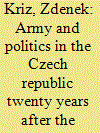

|
|
|
|
|
| Publication |
2010.
|
| Summary/Abstract |
This article focuses on relations between army and politics in the Czech Republic after the 1989 Velvet Revolution. This article concludes that these relations in the Czech Republic achieved the parameters typical of consolidated democracies. The many problems that continue to exist in this area in the Czech Republic do not in any significant way deviate from what is typical of consolidated democracies. Therefore, the transformation of civil -military relations can be regarded as successful.
|
|
|
|
|
|
|
|
|
|
|
|
|
|
|
|
| 3 |
ID:
119610
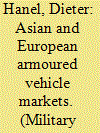

|
|
|
|
|
| Publication |
2012.
|
| Summary/Abstract |
With the start of the 21st century, the armed forces in Asia and Europe have been facing new demands as a result of radical changes in the security situation. In the foreseeable future, it is extremely unlikely that mentioned states will be threatened existentially by large - scale aggression using conventional means. Yet, safeguarding security and stability in both regions after the end of the Cold War and the need to meet global commitments for more exacting international conflict prevention and crisis management are leading to new tasks and demands placed on the Armed Forces.
|
|
|
|
|
|
|
|
|
|
|
|
|
|
|
|
| 4 |
ID:
128987
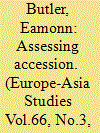

|
|
|
|
|
| Publication |
2014.
|
| Summary/Abstract |
On 1 May 2014, the European Union (EU) celebrated the tenth anniversary of the accession of ten member states-Cyprus, Czech Republic, Estonia, Hungary, Latvia, Lithuania, Malta, Poland, Slovakia and Slovenia. Of these ten new members, eight were Central and East European (CEE) countries that had, for most of the twentieth century, been governed by communist regimes either as republics of the Soviet Union (Latvia, Lithuania and Estonia), satellite states of the Soviet Union (Poland, Hungary, Czech Republic, Slovakia) or as a constituent republic of Yugoslavia (Slovenia). In the subsequent ten years three additional post-communist countries have acceded to the EU (Romania and Bulgaria in 2007 and Croatia in 2013). Commenting on the 2004 EU accession of the first eight former communist countries, the then Irish Prime Minister and President of the European Council, Bertie Ahern, wrote that there was
a particular historical resonance as eight of the former communist countries in the east have emerged from the shadows of the Iron Curtain to join us in working for common goals and for mutual benefit. The artificial divisions, which have blighted our continent's history for so long, are finally being laid to rest.1
|
|
|
|
|
|
|
|
|
|
|
|
|
|
|
|
| 5 |
ID:
169864
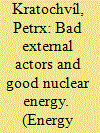

|
|
|
|
|
| Summary/Abstract |
For Central and Eastern European countries, energy security has been one of the top political topics ever since the 2009 gas crisis. Although these countries have a shared interest in this issue, their preferences – especially those regarding the role of Russia as their main energy supplier – are not identical. This paper examines and juxtaposes the discourses on natural gas supply in the Czech Republic and Slovakia. Utilizing a broadly constructivist perspective, the article explores the media discourses connected to energy supplies in these countries. Methodologically, the paper employs critical discourse analysis to examine this discourse. The paper argues that the media discourses in both countries underline the overall unreliability of the external environment and stress the necessity to rely on domestic energy sources. In the Czech case, such an environment also includes the EU, which translates into a critical stance towards renewable energy, viewed as being forced on country by the EU. In contrast, the Slovak discourse presents the EU as a suitable arena for energy cooperation. Both countries agree on the support for nuclear energy, which is considered to be a domestic – and therefore most reliable – energy source.
|
|
|
|
|
|
|
|
|
|
|
|
|
|
|
|
| 6 |
ID:
074550
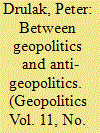

|
|
|
|
|
| Publication |
2006.
|
| Summary/Abstract |
This article examines the role of geopolitics in modern Czech political thinking. It draws on the distinction between geopolitics and anti-geopolitics to argue that the dominant tradition of Czech political thinking is anti-geopolitical. This anti-geopolitics is presented by a review of four central figures of Czech political thought since the nineteenth century (Palacký, Masaryk, Nejedlý and Havel). However, it also shows that geopolitics represents an important undercurrent in Czech political thinking which tends to dominate for brief periods of turmoil. Three such periods are addressed: the early 1920s, the late 1930s and the early 1990s.
|
|
|
|
|
|
|
|
|
|
|
|
|
|
|
|
| 7 |
ID:
145308
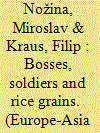

|
|
|
|
|
| Summary/Abstract |
Since 1975, the numbers of Vietnamese living in Europe have steadily increased. As new emigrants appeared in various countries, new types of crime came with them. Also in the Czech Republic, where a relatively large Vietnamese diaspora has been in existence since communist times, numerous Vietnamese criminal networks were established. The Vietnamese networks have a specific structure and modus operandi. Their bosses create parallel power structures within the Vietnamese diaspora and frequently merge together legal and illegal activities. The Vietnamese criminal networks are engaged in a broad spectrum of criminal activities, including economic crime, people smuggling and trafficking in drugs.
|
|
|
|
|
|
|
|
|
|
|
|
|
|
|
|
| 8 |
ID:
128994
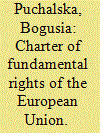

|
|
|
|
|
| Publication |
2014.
|
| Summary/Abstract |
The proclamation of the Charter for Fundamental Rights of the European Union, in December 2000 at Nice, France, followed by its inclusion within the failed Constitutional Treaty and its current status as a legally binding document under the Treaty of Lisbon, charts the changing fortunes of European Union politics dealing with fundamental rights protection. This article outlines the main rationales and hopes behind the enactment of the Charter and notes that through the process of political conditionality it may have been devalued from its very conception. The article suggests that, following their accession, Poland, and later the Czech Republic, used the Charter and Lisbon Treaty negotiations, including their opt-outs from the Charter, to engage in a game of power politics that had both domestic and European undertones. This politics of power game-play reflected a need by both states, and Poland in particular, to respond to both the political conditionality that they had been required to sign up to as part of the accession process and to emphasise how membership had improved their negotiating power. The article suggests that the consequence of this action by both states has not only further devalued the Charter but potentially undermined the rights of Polish and Czech citizens.
|
|
|
|
|
|
|
|
|
|
|
|
|
|
|
|
| 9 |
ID:
169133
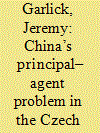

|
|
|
|
|
| Summary/Abstract |
Although it appears that China’s state capitalism model means that state-owned and private companies are utilised in the service of foreign policy goals such as international investments under the umbrella of the Belt and Road Initiative (BRI), the reality is more complex. The behaviour and interests of Chinese commercial actors do not always correspond with the stated aims and strategy of government officials. The article examines Chinese economic diplomacy in the Czech Republic from 2015 to 2018, assessing the extent to which the private company CEFC China Energy acted as an agent of the Chinese state as part of a coordinated strategy designed to increase Chinese economic and political influence via the use of economic incentives. CEFC was at the forefront of Chinese investments in the Czech Republic during this period but CITIC, a Chinese state-owned enterprise (SOE), took over these in May 2018 while the head of CEFC was reportedly being detained in China. The research is theorised in terms of the principal–agent problem, which posits that conflicts of interest and asymmetries of information affect coordination between principals (such as Chinese leaders) and agents (such as private companies). Since the case study reveals conflicts of interest between principals and agents in Chinese state-led economic diplomacy in the Czech Republic, it has implications for understanding the characteristics and practical implications of BRI-framed investment drives in the remainder of the Central and Eastern Europe region.
|
|
|
|
|
|
|
|
|
|
|
|
|
|
|
|
| 10 |
ID:
091747
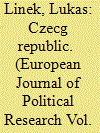

|
|
|
| 11 |
ID:
171650
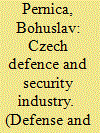

|
|
|
|
|
| Summary/Abstract |
The paper summarises the evolution of the iron triangle of the mutual relationships amongst the ministry of defence, defence industry, and the political elite in the post-communist Czech Republic in 1990-2020. The essay stresses the oddness of this relationship. On the one hand, the government is bound by a partnership to the Defence and Security Industry Association of the Czech Republic (DSIA), a lobbying group of more than 100 organisations that conduct business in defence and security sector in Czechia. Yet, since its creation in 2000, this assemblage of industries within DSIA's market position is falling, in fact. Neither political parties in power, nor the governments have been able to support national defence industry through the small military. Just a few DSIA national members are able to compete internationally with their cutting-edge products. Others have evolved into middlemen trading intime-expired Czechoslovak equipment retired from the Czech Armed Forces.
|
|
|
|
|
|
|
|
|
|
|
|
|
|
|
|
| 12 |
ID:
123824
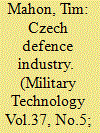

|
|
|
|
|
| Publication |
2013.
|
| Summary/Abstract |
Historically, a powerhouse for the production of weapons and military systems, the Czech republic's defence industry has undergone massive change since the fall of communism. Based on a wide spread heavy industrail base dating from WWII and before, Czech defence systems, swathe across Europe for decades. The changes, however, that the "New World Order" has brought about and that have had effects of various degrees of drama elsewhere on the continent have not spared Czech industry. It is fair to say, that the resilience and innovative spirit of the Czechs have resulted in the emergence of a newer, learner industrial base that capitalises on existing capabilities and develops markers for new, niche capabilities.
|
|
|
|
|
|
|
|
|
|
|
|
|
|
|
|
| 13 |
ID:
123825
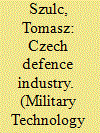

|
|
|
|
|
| Publication |
2013.
|
| Summary/Abstract |
The article offers information on Czechoslovakia ones was Europe's strongest and most innovative defense industries since reemergence of the country in 1918. It mentions that the country managed to producing weapons and innovations till the Second World War. It reports after the dissolution of Czechoslovakia in 1993 has a rapid decrease ion the industry occurred. It reports that the small Czech Armed Forces (ACR) of the country not supporting the industry with significant orders.
|
|
|
|
|
|
|
|
|
|
|
|
|
|
|
|
| 14 |
ID:
070986
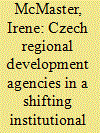

|
|
|
|
|
| Publication |
2006.
|
| Summary/Abstract |
In recent years regional development disparities in the Czech Republic have been increasing, regional policy and regionalisation have moved up the national political agenda, and considerable regional development resources have become available through EU Structural Funds. The Czech Republic now has more than 18 institutions that describe themselves as Regional Development Agencies (RDAs), with a wide range of policy and practical experience and, in the present climate, they should now be poised to take on a key regional development role. However, their function and position in regional development networks is continually plagued by uncertainty, and they are struggling to fulfil the 'ideal' of what an RDA is and what it should do. This article asks why this is the case and examines how domestic and EU policy agendas and actors have influenced the role and function of RDAs in the Czech Republic. Whilst theories such as 'new regionalism' suggest that RDAs can lead integrated, bottom-up regional development actions, it is questionable whether Czech RDAs have the capacity to adapt to the type of role that proponents of this approach expect.
|
|
|
|
|
|
|
|
|
|
|
|
|
|
|
|
| 15 |
ID:
072794
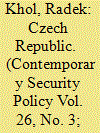

|
|
|
|
|
| Publication |
2005.
|
| Summary/Abstract |
Missile defence is an issue in Czech politics that touches upon the roots of Czech security policy, and combines its vital NATO and US bilateral dimensions. Several factors clearly come into play in explaining the main sources of the debate and the actual course of Czech missile defence policy. Pragve's foreign and security policy is determined by Atlanticist motives, intra-Alliance solidarity and a pragmatic approach towards a project seen as a top priority for the Bush administration. However, the Czech government must be cautious in its missile defence policy as Parliament has considerable influence over the security and defence policy domain. Its core power rests with the constitutional requirement for approval of any stationing of foreign troops on Czech territory, including missile defence installations. As the Czech political scene is divided on this issue we can expect a heated debate on missile defence in the future.
|
|
|
|
|
|
|
|
|
|
|
|
|
|
|
|
| 16 |
ID:
108985
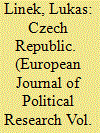

|
|
|
| 17 |
ID:
112329
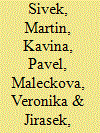

|
|
|
|
|
| Publication |
2012.
|
| Summary/Abstract |
In 2010, the Czech Republic was one of the states of the European Union, which met the indicative target for the share of renewable energy sources in gross electricity consumption. That year, gross electricity generation from renewable sources amounted to a total volume of 5851 GWh, which corresponds to 8.24% of gross electricity consumption in the Czech Republic in the given time period. The largest share of the total came from hydroelectric power plants (47.7%) and biomass power plants (25.8%), and a smaller share from photovoltaic power plants (10.5%), biogas power plants (8.7%) and wind farms (5.7%). Compared with 2009, the highest year-on-year growth came from photovoltaic power plants (527 GWh, 44.2%) and, as far as other renewable sources are concerned, electricity generation at hydroelectric power plants (360 GWh, 30.2%) and biogas power plants (184 GWh, 15.4%) rose more sharply as well.
|
|
|
|
|
|
|
|
|
|
|
|
|
|
|
|
| 18 |
ID:
096799
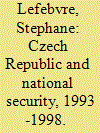

|
|
|
| 19 |
ID:
174518
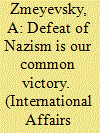

|
|
|
| 20 |
ID:
087892
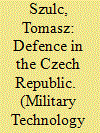

|
|
|
|
|
| Publication |
2009.
|
| Summary/Abstract |
This article is to provide an overview of the current status and future prospects of the Czech armed forces, as well as an assessment of the capabilities and commercial results of the domestic defence industry. While there are obvious links in many countries between the overall defence posture and the defence industry, this link has traditionally been particularly strong in the
Czech Republic.
|
|
|
|
|
|
|
|
|
|
|
|
|
|
|
|
|
|
|
|
|